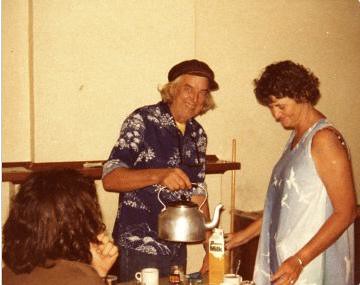Sometimes people can engage in suicidal behaviour due to command hallucinations. They report hearing voices that are telling them to be suicidal in some way.
There are two schools of thought on this. One school says that you should confront the crazy beliefs in this case the auditory hallucinations. Saying in a clear and direct way that the voices are not real and endeavoring to get the the person into Adult ego state.
The other school of thought says that you don’t confront the irrational belief, instead you engage the voices with questions such as
Ask - do you recognize the voices?
Ask - what are they saying?
Then one can talk to the voices in an effort to defuse their destructiveness. The problem in doing this is the therapist is colluding with the crazy part of the Child ego state which believes the voices are real when in fact they are not. So in this way one is supporting the problem.

When I worked in a prison there were a number who I dealt with who also reported hearing voices. Most of these would not have been diagnosed as psychotic and this raises the question of does a person who hears voices have to be diagnosed as suffering auditory hallucinations. In recent times there has been a lot written on this and it is now accepted that voice hearing does not have to equate to a psychotic symptom.
Hearing voices can be a very disturbing experience, both for the person who hears voices and family and friends. Until recently voices were regarded as a symptom of a mental illness and not talked about because of fear of stigma.
Hearing voices are still considered by psychiatry as an auditory hallucination and as a symptom of conditions such as schizophrenic disorders, manic depression and psychosis. The orthodox treatment is with major tranquilizers. These do not get rid of the voices.
In the past mental health professionals were taught not to let voice hearers talk about their voices as this was thought to be colluding with the person’s delusions and not helpful. Most often professionals sought to distract the voice hearer from their voices.
Research has shown that many people hear voices, and some cope well with their voices, without psychiatric intervention. It has also been found that many people who hear voices regard them as a positive part of their lives.
Throughout history and even today there are people who hear voices who find their voices inspirational and comforting. Many researchers, practitioners and voice hearers believe it is mistaken to regard voice hearing as part of a psychopathic disease syndrome. Rather, they consider it to be more akin to a variation in human experience - a special faculty or difference that definitely does not need a cure.
This means it is no longer a sustainable position to think of voices as part of a disease syndrome, such as schizophrenia. Instead hearing voices can be regarded as a meaningful, real (although sometimes painful, fearful and overwhelming) experience that speak to the person in a metaphorical way about their life, emotions and environment. For instance, people experiencing distress as a consequence of abusive or commanding voices can often recognize their voices as those of their
actual abusers and the voices have the effect of attacking their sense of self esteem and worth.
the voice may be experienced as coming from inside your head or from outside the head or even outside the body
the voice may talk about you or to you
the voices maybe distressing and abusive
you don’t know what they are going to say next
at times there can be more than one voice and sometimes the voices are from people you know and sometimes they are unknown
Graffiti























